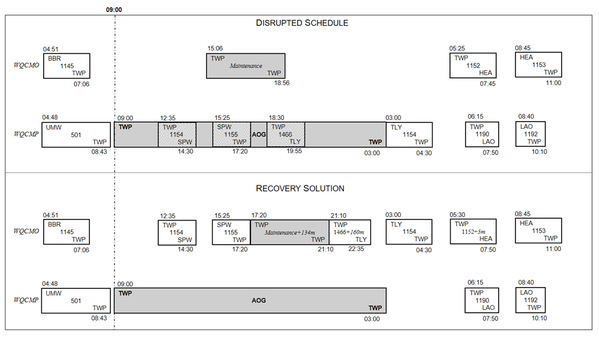Airline schedules are frequently disrupted by unexpected events such as poor weather conditions, aircraft mechanical failures, airport congestions and crew absences. The Aircraft Recovery Problem is usually solved to help airlines repair the disruptions by properly rescheduling their flights and rerouting the aircraft. This research by Dr. Zhouchun Huang proposes an innovative copy generation approach for solving the problem in a timely manner. The work is recently published in European Journal of Operational Research (EJOR). Rated 4* (the highest) in the ABS ranking list, the EJOR publishes high quality, original papers that contribute to the methodology of operational research (OR) and to the practice of decision making. The abstract of the paper is copied below.

Airline schedules are frequently disrupted by unexpected events such as poor weather conditions, aircraft mechanical failures, airport congestions and crew absences, resulting in tremendous costs to airlines and passengers in addition to those originally planned. The Aircraft Recovery Problem (ARP) is usually solved to help airlines repair disrupted schedules by properly rescheduling their flights and rerouting the aircraft such that the total recovery cost is minimized while a set of operational and maintenance constraints are satisfied. When the flight retiming is allowed in a recovery solution, we can copy a flight by shifting its scheduled time and include the copies in the ARP model to determine either the original flight or one of its copies is to be flown by an aircraft. Many previous studies generate flight copies in some arbitrary manner and the quality of each copy is not assessed. In this paper, we propose a copy evaluation method and develop a solution approach to the ARP by incorporating the method within an iterative process of copy generation and filtration. The approach relies on repeatedly solving the ARP linear programming relaxation defined on time-space networks with respect to each aircraft and evaluating the copies to be added into the networks based on the solution obtained. The goal is to produce a limited number of copies but enough to help reduce recovery cost. Through computational experiments using real airline data, we demonstrate that our approach is able to provide promising recovery solutions in reasonable computational time.
If you are interested in the research, please read the paper:
Zhouchun Huang, Xiaodong Luo, Xianfei Jin, Sureshan Karichery. An Iterative Cost-driven Copy Generation Approach for Aircraft Recovery Problem[J]. European Journal of Operational Research, 2021.
A full version of this article could be viewed at:
https://doi.org/10.1016/j.ejor.2021.10.055.

Nanjing University of Aeronautics and Astronautics
Copyright 2017 | All Rights Reserved with NUAA
